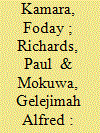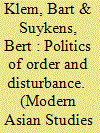| Srl | Item |
| 1 |
ID:
183921


|
|
|
|
|
| Summary/Abstract |
Ebola Virus Disease struck Sierra Leone in May 2014. An international response was instrumental in ending the epidemic by December 2015 and has been extensively documented. Less attention has been paid to local responses. Here, we focus on a case in which there was no infection despite high infection in neighbouring areas. This brings into focus the role of customary public authority in implementing successful controls. We pay particular attention to the activities of a chiefdom Ebola Task force committee chaired by the Paramount Chief. Meetings were characterised by protocol and ceremony, but ‘face time’ served to reinforce, in ritual terms, important messages about quarantine and social distancing. The committee's pronouncements had illocutionary force. Local volunteers translated this ceremonial message into practical action to block imported cases. The analysis of ceremonial competence, we conclude, opens a window into how public authority addresses developmental shocks in Africa.
|
|
|
|
|
|
|
|
|
|
|
|
|
|
|
|
| 2 |
ID:
160161


|
|
|
| 3 |
ID:
160163


|
|
|
|
|
| Summary/Abstract |
In 1968 a popular movement emerged on the streets of Pakistan which toppled the regime of General Muhammad Ayub Khan and ushered in the Pakistan People's Party (PPP). After a decade of military rule this movement was heralded as a turning point in the country's political fortunes. However, the war in 1971, the failure of the PPP to live up to its radical slogans, and Pakistan's eventual return to military rule in 1977 were seen as clear indications of the failure of both the movement and the PPP. This article focuses on the area of Kot Lakhpat in Lahore and the emergence of a worker-led court under Abdur Rehman to argue that this narrative of the failure of the movement does not leave space for local success stories which, while temporary, had an important impact on the role that the working classes imagined for themselves within the state. The Kot Lakhpat movement was part of a longer history of labour politics, and its story challenges the centrality of the PPP and shows how local structures of authority can be formed in response to the greater space for radical action opened up by a wider national resistance movement.
|
|
|
|
|
|
|
|
|
|
|
|
|
|
|
|
| 4 |
ID:
160162


|
|
|
|
|
| Summary/Abstract |
In this article, we compare two kinds of public authority under conditions of civil war. We study two villages in eastern Sri Lanka, both of which came under LTTE rule during the 1990s and 2000s. The first case study describes a rural development society, which was co-opted by the LTTE to rule the village. The second describes the leaders of a Hindu temple, who defied LTTE attempts to settle temple-related conflicts. Conceptually, we draw on the notion of the public sphere as a space of encounter between the rulers and the ruled. This perspective helps us come to grips with the convoluted political landscape of war. Our two case studies suggest that public authority and sovereignty are mutually constituted. We argue that both forms of power are reworked in the encounter with the public sphere. A sovereign aspirant like the LTTE does not simply impose itself on society, it encroaches on it. This involves contingent efforts of reigning in other forms of public authority, some of which are more defiant than others. Conversely, public authority not only derives validity from sovereign endorsement, but from contestations around sovereignty as well.
|
|
|
|
|
|
|
|
|
|
|
|
|
|
|
|